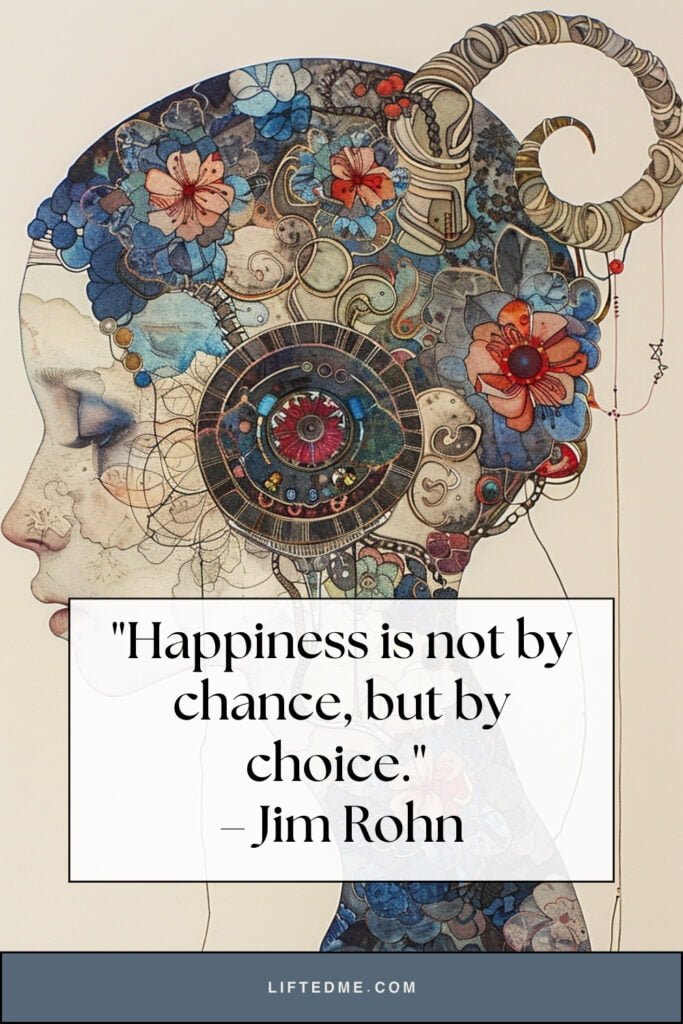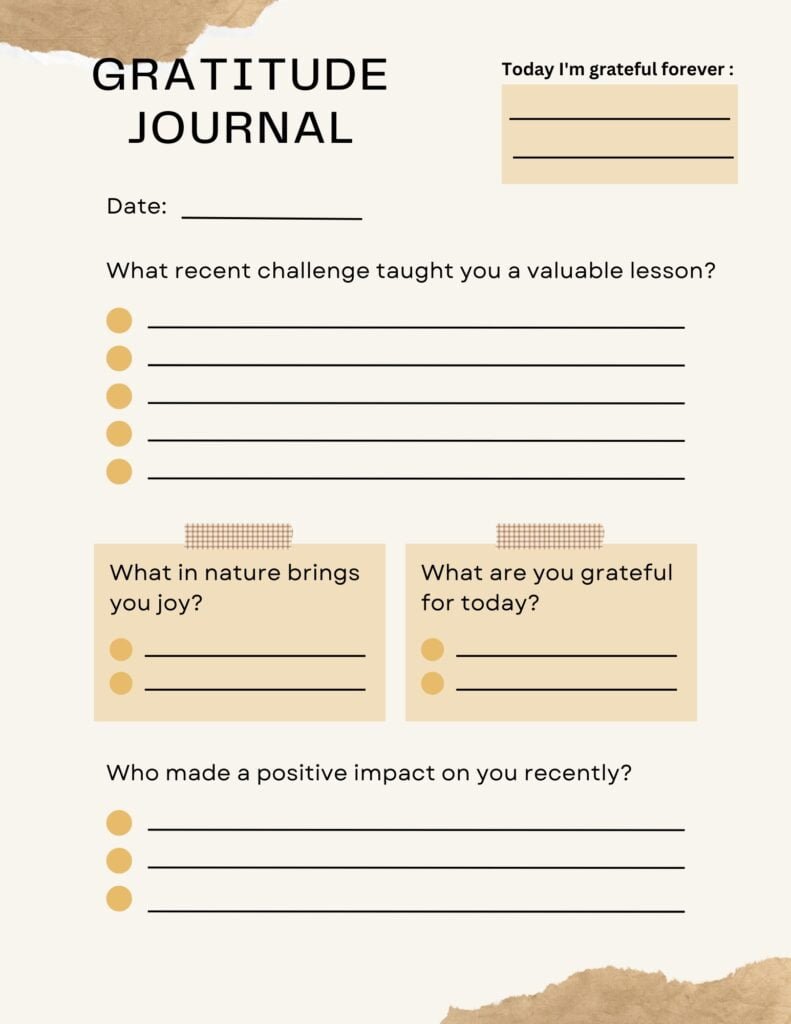Create A Gratitude Journal: How To And Benefits
This post contains paid and/or affiliate links. I make a small commission at no extra cost to you. Please see our Privacy Policy.
Keeping a gratitude journal can change your life. It’s a simple way to boost your well-being. By writing down what you’re thankful for, you can feel happier, less stressed, and sleep better.
It can also help you better understand yourself, stay positive, and build stronger relationships. Plus, it can even make you healthier.
Writing about the good things in your life can change how you see the world. It helps you focus on what you have, not what you don’t.

Gratitude journaling is linked to many benefits, like a stronger immune system and more joy.
50 Self-Reflection: Transforming Life Journal Prompts (1123 downloads )What is a Gratitude Journal?
A gratitude journal is where you write down the good things in your life. It’s for noting everything you’re thankful for, big or small.
This includes simple joys like a sunny day or a delicious meal and deeper gratitude too.
The main idea is to focus on the positives. This helps train your brain to see the good in your daily life.
Check out our Daily Journals Collection
The Power of Focusing on the Positive
Gratitude can have a big impact on your well-being. It shifts your focus from what you lack to what you have a lot of. By regularly noticing and appreciating the good, you start expecting more positive things.
Studies show that daily gratitude journaling can improve sleep, reduce anxiety, boost immunity, and ease physical pain. Gratitude journaling is a powerful tool.
Journaling with gratitude can greatly improve mental health. It changes how your brain works, making you more aware of the positive.
Being specific and feeling positive when listing what you’re grateful for makes it more effective.
Regular gratitude journaling helps you see beauty in life more easily. Holding positive feelings for a few seconds can help remember them for a long time.

According to the Greater Good Science Center’s white paper titled “The Science of Gratitude” (2018), practicing gratitude can lead to increased happiness, positive mood, and overall life satisfaction.
Benefits of Keeping a Gratitude Journal
Keeping a gratitude journal brings many benefits to your well-being. It can make you happier and more positive. It also helps reduce stress and improve sleep.
Boosts Happiness and Positivity
Writing down what you’re thankful for shifts your focus to the good things. This can make you feel happier and more joyful. It can also make you more optimistic, expecting good things to happen.
Reduces Stress and Improves Sleep
Thinking about the good things in your life can calm you down and lower your stress levels. Writing down what you’re grateful for sets a positive mood, and before bed, it helps quiet your mind for better sleep.
Enhances Self-Awareness and Resilience
Gratitude helps you think about your day, relationships, and life. It shows you what’s important and how you see the world. It builds resilience, helping you recover from tough times by focusing on the good.
“Gratitude can turn a meal into a feast, a house into a home, a stranger into a friend.” – Melody Beattie
How to Start a Gratitude Journal
Starting a gratitude journal can improve your life. It helps you focus on the good things and feel more positive.
First, could you pick a journal that feels right to you? It could be a simple notebook, a fancy journal, or an app on your phone.
Choosing Your Journal
It’s important to choose a journal you’ll enjoy using. It should be something that feels personal to you. If it’s an old notebook or a unique gratitude journal, please make sure you’re excited to write in it daily.
Shop Our Journal Notebook https://liftedme.com/product-category/journals-notebooks/

Creating a Gratitude-Friendly Space
You can find a quiet spot where you can write without distractions. This could be a cozy corner at home, your favorite chair, or a bench in a park.
Having a special place for your gratitude journal helps make it a regular part of your routine.
Setting a Regular Journaling Routine
Being consistent is key to getting the most out of gratitude journaling. Pick a time that fits your schedule, like morning or before bed.
Set aside a few minutes each day to think about and write down the good things in your life. Over time, this will become a daily habit, making you happier and more fulfilled.
“Gratitude journaling helps counterbalance our negativity bias and makes gratitude a natural habit, leading to happier days.”
| Gratitude Journal Types | Benefits |
|---|---|
| Bullet journals, journals with prompts, expanded gratitude journals, daily calendar journals, one-minute gratitude journals, hardcover journals, spiral notebooks, and gratitude journal apps | Increased personal joy, better sleep, exercising more regularly, lowering symptoms of physical pain, greater connection to others, lower risk of heart disease, diabetes, cancers, and lifestyle diseases, stronger immune system, sharper memory, better mood, and self-confidence. |
By following these simple steps, you’ll be on your way to starting a gratitude journal. This can change your mindset and make your life richer in many ways.
Gratitude Journal Prompts and Ideas
Using gratitude journal prompts can make your journaling more interesting. These prompts help you see the many things you’re thankful for. By changing them up, you keep your gratitude journaling exciting and meaningful.
Here are some great gratitude journal prompts:
- Reflecting on the best part of your day
- Expressing appreciation for a loved one
- Acknowledging your personal strengths
- Identifying a recent challenge you were able to overcome
Studies show that focusing on the positive can reduce stress and improve sleep. Writing down what you’re thankful for can also improve your relationships.
Keeping a gratitude journal can make you feel more content and accepting. It can also encourage you to see life more positively.
Focusing on senses like sight, smell, touch, sound, or taste can help one become more aware and thankful for the world.
Sharing personal experiences in your gratitude journal can make you more mindful and grateful.

For example, noticing the sounds in nature or daily life can increase your gratitude.
| Gratitude Journal Prompt | Potential Reflection |
|---|---|
| Reflect on your day and write down three things you are grateful for. | I am grateful for the delicious home-cooked meal my partner prepared, the productive work session I had, and the chance to enjoy the sunset from my favorite spot. |
| Identify a personal strength you possess and explain how it has positively impacted your life. | I am grateful for my empathetic nature, which allows me to provide comfort and support to my friends and family when they need it most. |
| Write about a challenging situation you’ve overcome and what you learned from the experience. | I am grateful for the resilience I developed when navigating a difficult work transition. The experience taught me the importance of adaptability and problem-solving skills. |
Gratitude journaling can bring you peace and calm by focusing on simple joys and blessings. Starting with specific prompts, like writing about things that made your day better or people you’re thankful for, can help.

Create a Gratitude Journal: How to and Benefits
Creating a gratitude journal is a simple yet powerful way to improve your well-being. By writing down what you’re thankful for, you can boost your happiness, reduce stress, improve your sleep, enhance your self-awareness, and cultivate a more positive and optimistic outlook on life.
Writing in a gratitude journal can make you feel happier and less lonely. It can also help you sleep better and lead to a healthier lifestyle. People who are grateful tend to exercise more and take better care of their health.
They also feel less pain, have a stronger immune system, and feel healthier overall.
Adding gratitude journaling tips to your daily life can greatly improve your well-being. Here are some steps to start:
- Set aside a few minutes each day to think about what you’re thankful for, no matter how small.
- Write down your thoughts and feelings in a journal, focusing on what made you feel thankful.
- Try different gratitude journal prompts, like thinking about past good times, appreciating yourself and others, or finding gratitude in everyday things.
- Make it a habit to write in your journal at a regular time, like morning or before bed.
The benefits of a gratitude journal are many and well-known. By making gratitude a regular part of your life, you can grow personally, improve your mental health, and feel better overall.
| Gratitude Journal Benefits | Research Findings |
|---|---|
| Improved Sleep Quality | Gratitude journaling led to more sleep hours, less time awake before sleep, and feeling refreshed in the morning. |
| Enhanced Resilience | Gratitude made people more resilient, especially after trauma, and lowered depression and anxiety rates. |
| Boosted Self-Esteem and Motivation | Grateful athletes had higher self-esteem and were more motivated to achieve their goals. |
| Improved Physical Health | Gratitude led to better self-care habits, like regular exercise and healthy eating. |
Adding a regular gratitude journaling practice to your life can bring many benefits. Start your gratitude journey today and see how this simple practice can change your life.
“Gratitude turns what we have into enough.” – Aesop
Incorporating Gratitude into Your Daily Life
Being grateful isn’t just about writing in a journal. It’s about making it a part of your everyday life. By incorporating gratitude daily, you can see its deep benefits and change your focus to the positive.
Making Gratitude a Habit
To really feel the power of gratitude, make it a habit. Pick a time that works for you, like morning, before bed, or during your commute. Promise to write in your gratitude journal every day.
Studies say writing down three things you’re thankful for daily can make you more grateful.
But journaling isn’t the only way to be grateful. You can also do gratitude walks, meditate, or start your day thinking of things you’re thankful for.
These actions can help you make gratitude a habit and bring many benefits.

Sharing Gratitude with Others
Gratitude isn’t just for you; it’s also about sharing with others. Saying thanks to those in your life, like family, friends, or even strangers, can strengthen your relationships and show them they’re important.
When you share gratitude and make it a habit, you build positive, strong, and rewarding relationships. It makes life more fulfilling.
The Science Behind Gratitude and Well-Being
Studies show that gratitude has a big impact on our well-being. It helps us feel happier, less stressed, and more aware of ourselves. Practicing gratitude can make us more resilient.
Many adults say they value happiness more than health. This shows how important gratitude is in our lives. When partners show thanks to each other, their relationships last longer because of trust and loyalty.
Writing in a gratitude journal can help reduce stress and improve sleep. It also makes us more aware of our feelings. Being grateful can make us feel more alive, full of energy, and motivated to work hard.
Grateful employees work better and are more productive. Saying thank you at work builds stronger relationships and improves teamwork.
“Believe in yourself and all that you are”
| Statistic | Findings |
|---|---|
| Neural mechanisms of gratitude | Gratitude is linked to certain brain areas, like the right anterior temporal cortex. People who are thankful have more gray matter in the right inferior temporal gyrus. |
| Neurochemical effects of gratitude | Being thankful makes the brain release dopamine and serotonin. This improves our mood and overall well-being. |
| Gratitude and physical health | Being thankful is good for our heart health. It can lower blood pressure and help control our heart rate and breathing. |
| Gratitude and mental health | Studies of 70 papers found that being thankful is linked to less depression. Practicing gratitude can help us bounce back from tough times. |
| Gratitude and social well-being | Being thankful helps our social lives. It makes our relationships better at work, school, and home, leading to a happier life. |
Gratitude is key to our mental, emotional, and physical health. It also helps us connect better with others and live a better life.
Overcoming Obstacles to Gratitude
Practicing gratitude can make us happier, help us sleep better, and make us more aware of ourselves. But it’s not always easy to keep up with a gratitude journal.
Things like arrogance and feeling entitled can stop us from being thankful.
Researchers found some things that can prevent us from being grateful. For example, we might get used to the good things in our lives and stop noticing them, or we might focus too much on the bad things instead of the good.
Hard times can also make it hard to feel grateful, as we might not see the good things that can come from them.

Ingratitude and Its Enemies
To beat the challenges of gratitude, we need to face these “enemies”. Studies show that writing in a gratitude journal can make us feel less anxious and happier. It can even change our brains and make us more grateful in the future.
Other ways to grow gratitude include:
- Looking for positive experiences and things to be thankful for
- Being mindful to stay in the moment
- Being around people who are grateful and positive
- Celebrating the small wins and achievements
By facing the challenges that stop us from being grateful, we can make journaling a powerful tool. This can lead to a more fulfilling life and all the good things that come with being grateful.
Gratitude and Improved Mental Health
Practicing gratitude does more than make us feel happy and positive. Studies show it can also boost mental health. It helps reduce stress and depression symptoms and improves overall well-being.
Gratitude journaling helps us focus on the good things in life. It can be a strong way to handle mental health issues and make us more resilient.
Studies link gratitude to better physical health too. This includes less stress, a stronger immune system, better sleep, and lower blood pressure.
Gratitude practices can also improve mental health by regulating emotions and fostering emotional intelligence. Feeling grateful makes us feel more positive. This leads to more happiness, less loneliness, and better relationships.
Gratitude can also lower stress, especially during tough times like the COVID-19 pandemic. A 2020 study found it helps with anxiety and depression symptoms.
“The practice of gratitude can lower blood pressure, improve immune function, and facilitate more efficient sleep,” says Robert A. Emmons, professor of psychology at UC Davis.
Gratitude can lead to better physical health, mental well-being, and stronger relationships. Adding gratitude to our daily life opens a path to better overall well-being.
Conclusion
Creating a gratitude journal is easy yet powerful. It can change your life for the better. By writing down what you’re thankful for, you can feel happier and less stressed, sleep better, know yourself better, and see life more positively.
Adding gratitude to your daily life can make you mentally healthier and improve your quality of life.
Studies show that gratitude has many benefits. It can lower stress, make you feel better, improve relationships, and even help your health.
Gratitude journals help your brain focus on the good things in life, leading to more happiness, better mental strength, and better overall well-being.
Starting a gratitude journal can change how you see life. It shifts your focus from problems to blessings. By making gratitude a daily habit, you can see how it changes your happiness and well-being.
FAQ
What is a gratitude journal, and how does it work?
A gratitude journal is where you write down the good things in your life. It helps you focus on what you have, not what you lack. This can make you happier, less stressed, and more well.
What are the benefits of keeping a gratitude journal?
Writing in a gratitude journal can make you happier and more positive. It can also help you sleep better and feel more aware of yourself. Plus, it can make you more optimistic about life.
How do I start a gratitude journal?
Start by choosing a format you like, like a notebook or an app. Pick a quiet spot to write and set a regular time, like morning or night. Being consistent helps you develop a gratitude habit.
What kind of things should I write in my gratitude journal?
Write about anything you’re thankful for, big or small. This could be a sunny day, a tasty meal, or the support of your loved ones. Using prompts can help you explore more areas of your life and see the positive.
How can I incorporate gratitude into my daily life?
Besides journaling, make gratitude a daily habit by taking moments to think about what you’re thankful for. Sharing your gratitude with others can also strengthen your relationships and encourage a thankful attitude in others.
What are the scientific benefits of gratitude?
Studies show that gratitude is good for your mental, emotional, and physical health. It can make you happier, reduce stress and depression, boost your immune system, and improve your overall well-being.
How can I overcome obstacles to practicing gratitude?
Challenges like ingratitude and focusing on the negative can stop you from feeling grateful. To overcome this, make a conscious effort to think positively. Regular journaling and mindfulness can help.
How can gratitude improve my mental health?
Gratitude journaling can help with mental health issues by focusing on the good in your life. It can reduce stress and depression symptoms and improve your overall well-being and emotional control.
Source Links
- How to Practice Gratitude
- Gratitude Journal: 66 Templates & Ideas for Daily Journaling
- I Write in a Gratitude Journal Every Day, Here Are All the Benefits
- 14 Benefits of Practicing Gratitude (Incl. Journaling)
- Gratitude Journaling – What is it? What are the benefits? And how to g
- The Science of Gratitude
- What Is a Gratitude Journal and What Are The Benefits ? – Sarah D Rees



